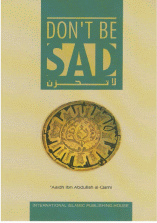Don't be Sad

Your value is determined by Your faith and character
He was poor and wan and weak. He wore a tom garment with many patches on it. He was barefoot and hungry. Along with his having an obscure lineage, he possessed neither status nor wealth nor family. Without a roof to shelter him, he would sleep in the mosque and drink from public fountains. His pillow was his own arm and his mattress was the uneven, rough ground beneath him. But he always remembered his Lord and he was constantly reciting the verses of Allah’s Book. He would not be absent from the first row in prayer or from the front lines of battle. One day he met the Messenger of Allah (bpuh), who upon seeing him, called him by his name, "O’ Julaybeeb, will you not marry?" "And who would give me their daughter?" was his meek reply. He (may Allah be pleased with him) passed by two others who asked the same question, to which he gave a similar reply. The Messenger of Allah (bpuh) said to him, "O’ Jualaybeeb, go to so and so, the Ansari, and say to him, ‘The Messenger of Allah sends his greetings of peace to you and he requests you to many me your daughter. "’ This particular Ansari was from a noble and esteemed household. When Julaybeeb carried out the Prophet’s order, the Ansari replied, "And peace be upon the Messenger of Allah. O’ Julaybeeb, how can I marry you my daughter when you have neither wealth nor status?" His wife heard of the news, and she exclaimed in astonishment, "Julaybeeb! He who has neither wealth nor status!” But their believing daughter heard the words of Julaybeeb, words that to her, contained the message of the Messenger of Allah. She said to her parents, “Do you turn down the request of the Messenger of Allah? By Allah, no!" Forthwith, the blessed wedding took place. When their first night came, a caller was in the streets announcing a forthcoming battle. Julaybeeb responded without delay and set out for the battleground. With his own hands, he managed to kill seven disbelievers, and then he himself became martyred. He embraced death pleased with Allah and His Messenger, and pleased with the morals for which he sacrificed his own life.
After the battle, the Messenger of Allah was asking about those who were martyred. The people began to inform him of those who died, but they forgot to mention Julaybeeb because of his obscurity. Nevertheless, the Messenger of Allah (bpuh) remembered him, and he said, “But I have lost Julaybeeb." He (bpuh) then found .Iulaybeeb’s corpse, the face of which was covered in dust. He shook off the dust from his face and said, "You killed seven and then you were killed! You are from me and I am from you..." And the Messenger of Allah (bpuh) repeated the second part of that statement three times. This medal of distinction from the Messenger of Allah (bpuh) is by itself an ample reward and prize.
The value of Julaybeeb was his faith and his love for the Messenger of Allah, along with the principles for which he died. His humble circumstances and obscure family name did not prevent him from the great honor that was bestowed upon him. With his meager resources he achieved martyrdom, contentment, and happiness for this world and the Hereafter.
(They rejoice in what Allah has bestowed upon them of His Bounty, rejoicing for the sake of those who have not yet joined them, but are left behind [not yet martyred] that on them no fear shall come, nor shall they grieve) (Qur’an 3: 170)
So remember, it is your principles and your character that determine your value. Poverty has never stood immovable in the way of distinction and the achievement of higher aims.
